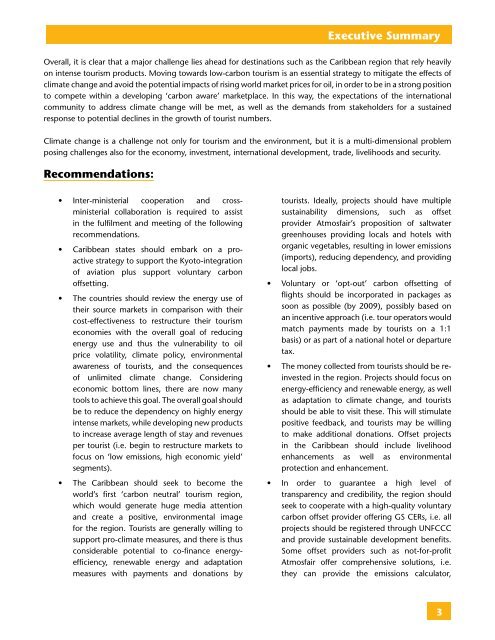Tourism & CC Challenges & Opportunities - Global Commons Institute
Tourism & CC Challenges & Opportunities - Global Commons Institute
Tourism & CC Challenges & Opportunities - Global Commons Institute
Create successful ePaper yourself
Turn your PDF publications into a flip-book with our unique Google optimized e-Paper software.
Executive Summary<br />
Overall, it is clear that a major challenge lies ahead for destinations such as the Caribbean region that rely heavily<br />
on intense tourism products. Moving towards low-carbon tourism is an essential strategy to mitigate the effects of<br />
climate change and avoid the potential impacts of rising world market prices for oil, in order to be in a strong position<br />
to compete within a developing ‘carbon aware’ marketplace. In this way, the expectations of the international<br />
community to address climate change will be met, as well as the demands from stakeholders for a sustained<br />
response to potential declines in the growth of tourist numbers.<br />
Climate change is a challenge not only for tourism and the environment, but it is a multi-dimensional problem<br />
posing challenges also for the economy, investment, international development, trade, livelihoods and security.<br />
Recommendations:<br />
• Inter-ministerial cooperation and crossministerial<br />
collaboration is required to assist<br />
in the fulfilment and meeting of the following<br />
recommendations.<br />
• Caribbean states should embark on a proactive<br />
strategy to support the Kyoto-integration<br />
of aviation plus support voluntary carbon<br />
offsetting.<br />
• The countries should review the energy use of<br />
their source markets in comparison with their<br />
cost-effectiveness to restructure their tourism<br />
economies with the overall goal of reducing<br />
energy use and thus the vulnerability to oil<br />
price volatility, climate policy, environmental<br />
awareness of tourists, and the consequences<br />
of unlimited climate change. Considering<br />
economic bottom lines, there are now many<br />
tools to achieve this goal. The overall goal should<br />
be to reduce the dependency on highly energy<br />
intense markets, while developing new products<br />
to increase average length of stay and revenues<br />
per tourist (i.e. begin to restructure markets to<br />
focus on ‘low emissions, high economic yield’<br />
segments).<br />
• The Caribbean should seek to become the<br />
world’s first ‘carbon neutral’ tourism region,<br />
which would generate huge media attention<br />
and create a positive, environmental image<br />
for the region. Tourists are generally willing to<br />
support pro-climate measures, and there is thus<br />
considerable potential to co-finance energyefficiency,<br />
renewable energy and adaptation<br />
measures with payments and donations by<br />
tourists. Ideally, projects should have multiple<br />
sustainability dimensions, such as offset<br />
provider Atmosfair’s proposition of saltwater<br />
greenhouses providing locals and hotels with<br />
organic vegetables, resulting in lower emissions<br />
(imports), reducing dependency, and providing<br />
local jobs.<br />
• Voluntary or ‘opt-out’ carbon offsetting of<br />
flights should be incorporated in packages as<br />
soon as possible (by 2009), possibly based on<br />
an incentive approach (i.e. tour operators would<br />
match payments made by tourists on a 1:1<br />
basis) or as part of a national hotel or departure<br />
tax.<br />
• The money collected from tourists should be reinvested<br />
in the region. Projects should focus on<br />
energy-efficiency and renewable energy, as well<br />
as adaptation to climate change, and tourists<br />
should be able to visit these. This will stimulate<br />
positive feedback, and tourists may be willing<br />
to make additional donations. Offset projects<br />
in the Caribbean should include livelihood<br />
enhancements as well as environmental<br />
protection and enhancement.<br />
• In order to guarantee a high level of<br />
transparency and credibility, the region should<br />
seek to cooperate with a high-quality voluntary<br />
carbon offset provider offering GS CERs, i.e. all<br />
projects should be registered through UNF<strong>CC</strong>C<br />
and provide sustainable development benefits.<br />
Some offset providers such as not-for-profit<br />
Atmosfair offer comprehensive solutions, i.e.<br />
they can provide the emissions calculator,
















